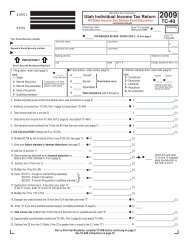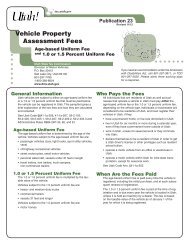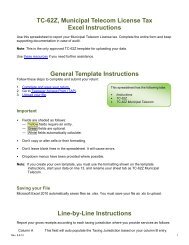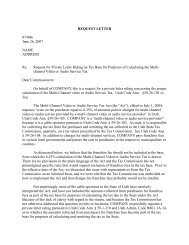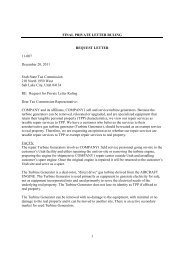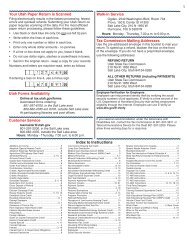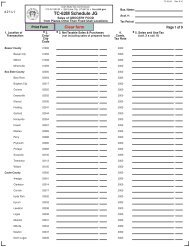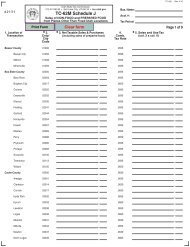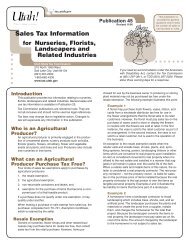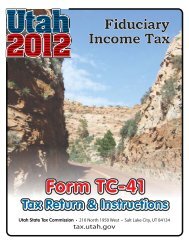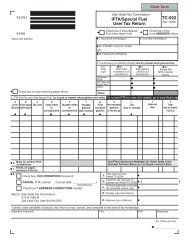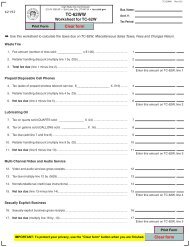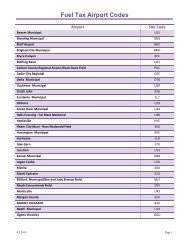Private Letter Ruling 08-012 - Utah State Tax Commission
Private Letter Ruling 08-012 - Utah State Tax Commission
Private Letter Ruling 08-012 - Utah State Tax Commission
You also want an ePaper? Increase the reach of your titles
YUMPU automatically turns print PDFs into web optimized ePapers that Google loves.
In the current situation, Corporation A is primarily providing access to and use of the<br />
prewritten computer software located on the ASP servers. The software involved is not merely<br />
incidental to the services of Corporation A. PLR 07-013 does not apply because it is<br />
distinguishable from the present situation. In PLR 07-013, the <strong>Commission</strong> found that the<br />
primary object or essence of the transaction was to provide a backup service, not to provide the<br />
software. In the current situation, the primary object or essence is to provide the software. 1<br />
<strong>Utah</strong> law imposes a sales tax on the sale of tangible personal property made within the<br />
state. See § 59-12-103 (1)(a), (k) and (l). Also, <strong>Utah</strong> law imposes a sales tax on the sale of a<br />
product that is transferred electronically if that product would have been subject to tax had that<br />
product been transferred in a manner other than electronically. See § 59-12-103(1)(n)(effective<br />
January 1, 2009). Before January 1, 2009, prewritten computer software transferred<br />
electronically was included in the definition of tangible personal property ( see §59-12-102(97)<br />
(effective until January 1, 2009)) and was taxable under § 59-12-103 (1)(a), (k), and (l). After<br />
January 1, 2009, prewritten computer software transferred electronically will be excluded from<br />
the definition of tangible personal property ( see § 59-12-102(1<strong>08</strong>)(c) (effective January 1, 2009))<br />
and will be taxable under § 59-12-103(1)(n). Basically, the tax treatment of prewritten computer<br />
software transferred electronically remains the same both before and after January 1, 2009; a sale<br />
of such is subject to tax if the sale is made within the state. In this case, Corporation A sold<br />
computer software transferred electronically, which sales may be taxable by <strong>Utah</strong> if the sales<br />
were made within <strong>Utah</strong>.<br />
By definition, prewritten computer software is not designed and developed by the author<br />
“to the specifications of a specific purchaser.” See §59-12-102(68) (effective until January 1,<br />
2009) and § 59-12-102(77) (effective January 1, 2009). In this case, the software is very likely<br />
to be prewritten; no facts suggest otherwise.<br />
“Sale” is defined as “any transfer of title, exchange, or barter, conditional or otherwise, in<br />
any manner, of tangible personal property or any other taxable transaction under Subsection 59-<br />
12-103(1), for consideration.” <strong>Utah</strong> Code Ann. § 59-12-102(83) (effective until January 1, 2009)<br />
and § 59-12-102(94) (effective January 1, 2009). Furthermore, a “sale” specifically includes<br />
“any transaction under which right to possession, operation, or use of any article of tangible<br />
personal property is granted under a lease or contract and the transfer of possession would be<br />
taxable if an outright sale were made.” Under Rule 92B, “[t]he sale, rental or lease of prewritten<br />
computer software . . . is subject to the sales or use tax regardless of the form in which the<br />
software is purchased or transferred.” In this case, Corporation A sold the prewritten computer<br />
software because the customers received the “right to…use of [an] article of tangible personal<br />
property” under their contracts. In your request letter, you provide that “[t]he <strong>Utah</strong> customers of<br />
1 On the other hand, if the primary object of the transaction of Corporation A is to offer services<br />
other than providing access to the software and if the software is just a tool of the ASP, then PLR<br />
07-013 may apply. In PLR 07-013, the software provider was the consumer of the software, not<br />
the customers. Likewise if the software were just a tool of the ASP, then the ASP would be the<br />
consumer of the software, not Corporation A or its <strong>Utah</strong> customers. Additionally, the ASP would<br />
be consuming that software out of state, on its servers located outside of <strong>Utah</strong>, so the software<br />
would not be subject to <strong>Utah</strong> sales tax.



